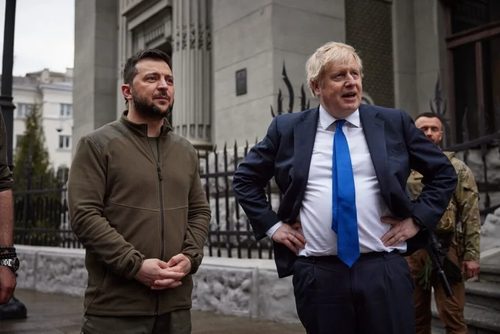Western Allies Led By UK’s Johnson Sabotaged Tentative Ukraine-Russia Peace Deal
There’s mounting evidence that the war in Ukraine could have been over by this point, but key Western backers of Kiev sought to sabotage the potential for peaceful settlement through negotiations. That’s precisely what regional Ukrainian media reports concluded as early as May, soon after the UK’s Boris Johnson showed up in the capital to meet with President Volodymyr Zelensky for the first time.
This is what a bombshell story in Ukrainska Pravda said at the time, but which was almost completely ignored in Western mainstream media:
According Ukrainska Pravda sources close to Zelenskyy, the Prime Minister of the United Kingdom Boris Johnson, who appeared in the capital almost without warning, brought two simple messages. The first is that Putin is a war criminal, he should be pressured, not negotiated with.
And the second is that even if Ukraine is ready to sign some agreements on guarantees with Putin, they [the UK and US] are not. Johnson’s position was that the collective West, which back in February had suggested Zelenskyy should surrender and flee, now felt that Putin was not really as powerful as they had previously imagined, and that here was a chance to “press him.”
The Ukrainian media English-language report went on to emphasize that Three days after Johnson left for Britain, Putin went public and said talks with Ukraine “had turned into a dead end”.
At the time the Istanbul peace talks, which saw top officials from each warring side gather in the Turkish capital, was hailed in some corners as “the quickest way to end the war in Ukraine” – according to Recep Tayyip Erdogan’s words, who was seeking to mediate between Moscow and Kiev.
But as the invasion ordered by Putin pressed on, Britain especially was the earliest out front in making large weapons and munitions deliveries to Ukraine via military transport planes a high priority. UK press reports also took note of the ‘convenient’ timing of London going all-in hawkish on Ukraine given Prime Minister Johnson’s enduring ‘Partygate Scandal’ at home.
Again, recall the tone of Ukrainian media following the arrival of the British prime minister in Kiev (and it should be noted Johnson first leader of a G7 country to visit, coming two weeks after Russian forces withdrew from suburbs around Kiev) on April 9:
Following the arrival of British Prime Minister Boris Johnson in Kyiv, a possible meeting between Ukrainian President Vladimir Zelenskyy and Russian President Vladimir Putin has become less likely.
Now, this week there’s been yet more bombshell smoking gun confirmation to emerge on the role of powerful Western countries in thwarting the potential for ceasefire between Russian and Ukrainian forces…
Ex US National Security Council official confirms citing “multiple former senior U.S. officials” that Russia & Ukraine agreed in April on peace deal framework of #Russia withdrawing to pre-war positions & #Ukraine promising not to seek #NATO membership. Deal was stopped by UK PM. https://t.co/Gsn1kXL6gI
— Ivan Katchanovski (@I_Katchanovski) August 30, 2022
Former official at the US National Security Council Fiona Hill has co-authored a lengthy essay recounting key moments in Russia’s war and Western efforts to aid Ukraine thus far.
She let slip the following key confirmation in the Council on Foreign Relations (CFR)-run Foreign Affairs journal:
According to multiple former senior U.S. officials we spoke with, in April 2022, Russian and Ukrainian negotiators appeared to have tentatively agreed on the outlines of a negotiated interim settlement: Russia would withdraw to its position on February 23, when it controlled part of the Donbas region and all of Crimea, and in exchange, Ukraine would promise not to seek NATO membership and instead receive security guarantees from a number of countries. But as Russian Foreign Minister Sergey Lavrov stated in a July interview with his country’s state media, this compromise is no longer an option.
This disclosure and confirmation from the US side – that there was a tentative agreement on the table for Russia-Ukraine peace is a huge revelation, again which will likely go largely missing from popular mainstream media coverage.
And of course, the glaring omission in the Foreign Affairs essay is Boris Johnson’s aforementioned direct role in scuttling the potential for peaceful settlement at what looked to be a ‘finish line’ moment. Whether or not peace would have ultimately held up will never be known.
What remains clear at this point is Ukraine’s “path to NATO” seems to have already been let go as a key talking point among Ukrainian leadership. And yet, there’s no signs of any peace or ceasefire negotiations that appear to be on the horizon, also as the Kremlin looks poised to possibly expand its war aims into annexation of territory.
Tyler Durden
Wed, 08/31/2022 – 15:25

